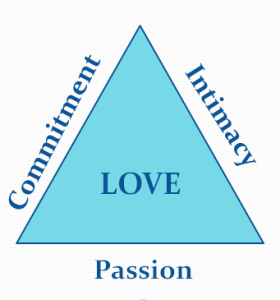Should I Stay or Should I Go? Part 1 – Using a Love Triangle to Assess Your Relationship
By Jamie C. Williamson, PhD
The most frequently asked question for me these days is “How do I know whether I should get divorced, or keep trying?” Sadly, many married people remain in this ambivalent “Should I Stay or Should I go” state for years .
.
During this time — which I call the Contemplative Phase of divorce – people go through the motions of their married life, but are not fully committed to investing in their marriage. It’s not rational, but to the person trying to figure out what to do, this state of ambivalence seems more comfortable (and preferable) than doing either the work needed to improve the marriage or mustering the courage to end it.
They just don’t know how to decide what to do. And, often they end up doing something to make their spouse miserable enough to initiate a divorce.
Problem solved, right? ……But, not really.
What if in the end, they figure out they didn’t really want a divorce? What if guilt haunts them because they know it is not appropriate or fair to make their spouse miserable so that they don’t have to take responsibility for their part of an unhappy marriage.
Don’t you just love third person pronouns? “They” might do this, but YOU wouldn’t….until you find your own confused, ambivalent, unhappy self wondering “should I stay or should I go”.
This post is the first in a three-part weekly series focused on applying the concepts of intimacy, commitment and passion to decide whether or not you should initiate actions to rejuvenate your marriage or initiate actions to dissolve it.
Robert Sternberg used these concepts to articulate his powerfully descriptive Triangle Theory of Love. I expand his theory by using the three dimensions of love as a guide for making decisions about marriage and divorce.
To get started, let’s examine the three dimensions of love that form the love triangle.
The Intimacy Dimension of Love represents the depth of the friendship you share with your spouse, how much you know about each other, support each other, and actually like each other. Specifically, the Intimacy Dimensions emphasizes:
• Do you and your spouse share mutual support?
• Do you feel comfortable in your marriage relationship? Or do you feel alone in your own home?
• Can you and your spouse automatically count on each other in time of need?
• What is the breadth and depth of your communication with each other? Do you discuss a narrow or broad range of topics? Do you stay on safe, routine, task-oriented topics? Or do you talk about your feelings, ideas, hopes and dreams?
• Do you understand each other? Do you try to understand your spouse? Do you share enough so your spouse can truly understand you?
• Do you trust your spouse? Does your spouse trust you? Should your spouse trust you?
The Commitment Dimension of Love represents the degree of dedication and/or obligation you feel toward your marriage, keeping in mind that dedication feels more voluntary to you than obligation, but they may look the same to others. Specifically, the Commitment Dimension emphasizes:
• Do you have confidence in the stability of your marriage?
• To what degree are you committed to maintaining your marriage?
• How strong is your sense of responsibility to your spouse?
• Do you feel that your marriage is permanent, no matter what?
• Do you feel that getting married was a good decision?
• Do you devote ample time to your marriage?
• Do you make future plans for your marriage and family?
• Do you speak favorably about your spouse to your friends and family?
The Passion Dimension of Love represents the romantic affection you share with your spouse. This romantic affection takes different forms, depending on age, physical capabilities, and length of relationship. Nonetheless, physical passion remains an important dimension of marital love at all ages and stages of marriage. The Passion Dimension of Love emphasizes:
• Are you physically attracted to your partner? Is your partner physically attracted to you? Do you make an effort to be physically attractive to your partner?
• Do you want to be with your spouse sexually more than you want to be with anyone else?
• Do you feel that your partner is good sexually? Does your partner think you are good sexually?
• Does your partner stimulate you sexually?
• Are you and your spouse sexually close? Do you talk about your sexual relationship?
• When you talk about any difficulties in your sexual relationship, are you warm, compassionate, and supportive? Is your spouse?
If you are knowingly stuck in a state of ambivalence about your marriage, you are voluntarily choosing not to be as happy as you could be. And, be assured, you are keeping your spouse from being truly happy, as well. Unless you are “all in”, you condemn you and your spouse to the marriage equivalent of a glass half empty.
Over the next week, try thinking about the Intimacy, Commitment, and Passion dimensions of love. Rate your relationship on a scale of 1(low) to 10 (high) on each of the dimensions. And, check in next week to learn how you can put this assessment to use.
If you are ready, share the Intimacy, Commitment, and Passion questions with your spouse. Then, start to Work it Out.
Sign up to receive future blog posts, including Part Two of this three-part series.
And, let me know if I can help.